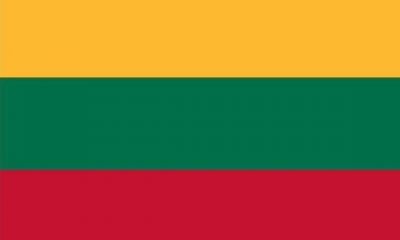
Featured Item

Legal stricture puts Lithuanian citizenship out of reach for many
Hundreds of applications worldwide for Lithuanian citizenship based on ancestry are being rejected by the Lithuanian Migration Department, some pending indefinitely and others being placed on hold.
This follows a Lithuanian Supreme Court decision in December 2020 which has opened the law up for interpretation, making it much tougher and dramatically slower to get citizenship.
In addition to what has always been accepted as sufficient proof of Lithuanian citizenship, applicants are now also required to provide proof that their Lithuanian immigrant ancestors actively sought to maintain their Lithuanian citizenship once in South Africa (or their new country of residence) until 15 June 1940. This applies to Litvaks around the world.
This is a departure from the original position, which never required any proof that citizenship was actively maintained after leaving Lithuania.
“This is a major obstacle for applicants as in almost all cases, no such proof exists. It has far-reaching implications for all future citizenship applications,” said Lithuanian emigration consultant Nida Degutiene from Next Steps.
Her company assists many South Africans to obtain Lithuanian citizenship by helping to source the required documentation for reinstatement of their citizenship. She told the SA Jewish Report some of her clients’ applications have recently been declined by the migration department because of this.
According to insiders, things changed following this court decision, which highlighted the law on all citizenship applications. “There is discussion about the exact interpretation of the Lithuanian law of citizenship,” Degutiene said.
This development has dramatically slowed down the application process, causing frustration, say insiders. The department has queried hundreds of pending applications, requesting this additional proof, which according to insiders is extremely difficult – if not impossible – for most people to produce.
There also appear to be many more declined applications than there were previously. In some cases where families have applied at different times using the same source documents, some have been granted citizenship, while others have been rejected.
Dainius Junevičius, the Lithuanian ambassador to South Africa, said 2 646 positive decisions were made by the migration department to reinstate citizenship for Jews from Lithuania living in South Africa between 2016 and 2020.
“The number increased tenfold in five years – from 119 in 2016 to 1 121 in 2020. During that period, the embassy accepted 2 116 passport applications and issued 1 679 passports. Last year, the consular section of the embassy exceeded all of its limits, and accepted 659 passport applications,” he said.
Junevičius said the migration department had processed 1 242 reinstatement requests last year. Citizenship had been reinstated in 1 121 cases, and rejected in 121 cases. “This gives about 90% positive decisions,” he said.
There is uncertainty about where people stand now regarding the prospect of gaining citizenship.
However, there may be hope on the horizon.
In recent weeks, following extensive lobbying, there are initiatives in parliament to amend the citizenship law. A Bill has recently been drafted formally supported by more than 30 members of the Lithuania Seismas (parliament).
“This is a very positive development,” said Degutiene.
The date for tabling the Bill, debating it, and voting whether or not to pass the Bill into law, is still to be decided.
The Bill, which requires a majority vote in its favour before being passed, aims to remove the requirement that applicants prove that their ancestor actively retained Lithuanian citizenship up until 15 June 1940. If the proposed amendment is passed, the requirement would be to prove only that their ancestor held citizenship at any time prior to 15 June 1940.
“This would likely ensure the success of many pending applications which are currently under query,” said Nicole Marcus of AccessEU.
It follows pressure from many service providers who have been actively engaging with Lithuanian authorities to amend the way in which applications are being considered.
Many have written to the Lithuanian Home Affairs Ministry to complain about the way in which the migration department is now considering applications, describing it as “unreasonable and unfair”.
The South African Jewish Board of Deputies (SAJBD) has written to Lithuanian authorities at the highest level, seeking to make things easier for South African Litvaks.
“This is a matter of principle,” said Zev Krengel, SAJBD national vice-president. “Most of our ancestors were forced to flee Lithuania under terrible circumstances, and restoring our citizenship will go a long way to heal and address the wrongs of the past.”
Krengel, who has visited Lithuania several times, received his passport in 2017 with his father, Julius, whose father fled the country in 1925 with literally “the clothes on his back”, according to Krengel.
The Board has written to the president and prime minister of Lithuania, including several other prominent members of parliament, appealing for an amendment to the law, correcting the wording so that citizenship of Lithuania will be reinstated as before.
The letter calls upon the leadership of Lithuania “to cherish and preserve” significant resolutions that allowed all people of Lithuania who were expelled or emigrated in pre-war times to return their citizenship and be part of the new Lithuania.
The SAJBD said it was concerned about “new legal barriers” which were creating obstacles for those applying for reinstatement of Lithuanian citizenship.
Junevičius, said the principle of state continuity was very important for Lithuania. “Modern Lithuania is a continuation of the pre-war Republic of Lithuania, which lost its independence on 15 June 1940, when it was occupied by the Union of Soviet Socialist Republics. All persons who were Lithuanian citizens on that day are considered Lithuanian citizens until now, regardless of where they lived then – in the United States, Russia, British territories, or elsewhere. We’re talking not only about Jews, but about people of all nationalities and faiths. Lithuanian legislators enshrined this principle of continuity of citizenship in the Law on Lithuanian Citizenship,” he said.
“According to the current law and the interpretation of the courts, there is an important condition for the reinstatement of citizenship – the person had to be a Lithuanian citizen on 15 June 1940, so that they or their descendants could reinstate Lithuanian citizenship,” he said.
“The majority of Jews living in South Africa are of Lithuanian descent. The reality is that not everyone meets the criteria for reinstating citizenship.”
If documents are missing or the migration department has doubts that the applicant was a Lithuanian citizen on 15 June 1940, the procedure takes time, he told the SA Jewish Report.
“We are well aware that some applicants cannot prove that their ancestors were Lithuanian citizens until 15 June 1940, and their requests are rejected. As long as this citizenship law and court interpretation is in force, no other solutions can be expected.”
Junevičius said it was important for prospective passport holders to show an interest in Lithuania.
“I’m frustrated that the Lithuanian passport is valued only because it provides an opportunity to travel around Schengen countries, without even visiting Lithuania,” he said.
Although the Lithuanian embassy in Pretoria was opened only in 2015, investment from South Africa in Lithuania is negative, and only 300 tourists from South Africa visited Lithuania in 2019.
“Lithuania is still an undiscovered place for South African Jews to do business, get a great higher education, spend a vacation, or even relocate to the country where their ancestors once used to live,” he said.
He said the embassy did its best to increase the speed of service to reduce waiting times, but asked for patience while booking a time slot for a visit at the consular section.











Rapp
June 10, 2021 at 3:56 pm
Now that you cant use a Lithuanian passport to work in the UK, its almost worthless
Grant Gochin
June 12, 2021 at 3:33 am
The Lithuanian Government threatens criminal charges against those that voice dissatisfaction with Lithuania’s Holocaust fraud, and against the rampant honoring of Holocaust perpetrators as Lithuanian national heroes.
Visiting the killing fields and the death pits containing our families is critically important, however the risk of criminal charges for saying the wrong thing is too high for any rational tourist.
Until the Lithuanian government guarantees Jews safe passage and no intimidation, Jews should stay away.
Until Judicial corruption in Lithuania is addressed, it is simply too risky for an investor to invest there.
Their passport is great for traveling though – truly useful.